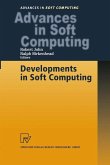What do colloids, fractals, liquid crystals, and polymers have in common? Nothing at first sight. Yet the distance scales, the energy transfers, the way these objects react to an external field are very similar. For the first time, this book offers an introduction to the physics of these soft materials in one single volume. A variety of experiments and concepts are presented, including the phenomena of capillarity and wetting, fractals, small volumes and large surfaces, colloids, surfactants, giant micelles and fluid membranes, polymers, and liquid crystals. Each chapter is written by experts in the field with the aim of making the book accessible to the widest possible scientific audience: graduate students, lecturers, and research scientists in physics, chemistry, and other disciplines. Nobel Prize winner Pierre-Gilles de Gennes inspired this book and has written a foreword.
We describe in this book, new methods for intelligent manufacturing using soft computing techniques and fractal theory. Soft Computing (SC) consists of several computing paradigms, including fuzzy logic, neural networks, and genetic algorithms, which can be used to produce powerful hybrid intelligent systems. Fractal theory provides us with the mathematical tools to understand the geometrical complexity of natural objects and can be used for identification and modeling purposes. Combining SC techniques with fractal theory, we can take advantage of the "intelligence" provided by the computer methods and also take advantage of the descriptive power of the fractal mathematical tools. Industrial manufacturing systems can be considered as non-linear dynamical systems, and as a consequence can have highly complex dynamic behaviors. For this reason, the need for computational intelligence in these manufacturing systems has now been well recognized. We consider in this book the concept of "intelligent manufacturing" as the application of soft computing techniques and fractal theory for achieving the goals of manufacturing, which are production planning and control, monitoring and diagnosis of faults, and automated quality control. As a prelude, we provide a brief overview of the existing methodologies in Soft Computing. We then describe our own approach in dealing with the problems in achieving intelligent manufacturing. Our particular point of view is that to really achieve intelligent manufacturing in real-world applications we need to use SC techniques and fractal theory.
We describe in this book, new methods for intelligent manufacturing using soft computing techniques and fractal theory. Soft Computing (SC) consists of several computing paradigms, including fuzzy logic, neural networks, and genetic algorithms, which can be used to produce powerful hybrid intelligent systems. Fractal theory provides us with the mathematical tools to understand the geometrical complexity of natural objects and can be used for identification and modeling purposes. Combining SC techniques with fractal theory, we can take advantage of the "intelligence" provided by the computer methods and also take advantage of the descriptive power of the fractal mathematical tools. Industrial manufacturing systems can be considered as non-linear dynamical systems, and as a consequence can have highly complex dynamic behaviors. For this reason, the need for computational intelligence in these manufacturing systems has now been well recognized. We consider in this book the concept of "intelligent manufacturing" as the application of soft computing techniques and fractal theory for achieving the goals of manufacturing, which are production planning and control, monitoring and diagnosis of faults, and automated quality control. As a prelude, we provide a brief overview of the existing methodologies in Soft Computing. We then describe our own approach in dealing with the problems in achieving intelligent manufacturing. Our particular point of view is that to really achieve intelligent manufacturing in real-world applications we need to use SC techniques and fractal theory.









